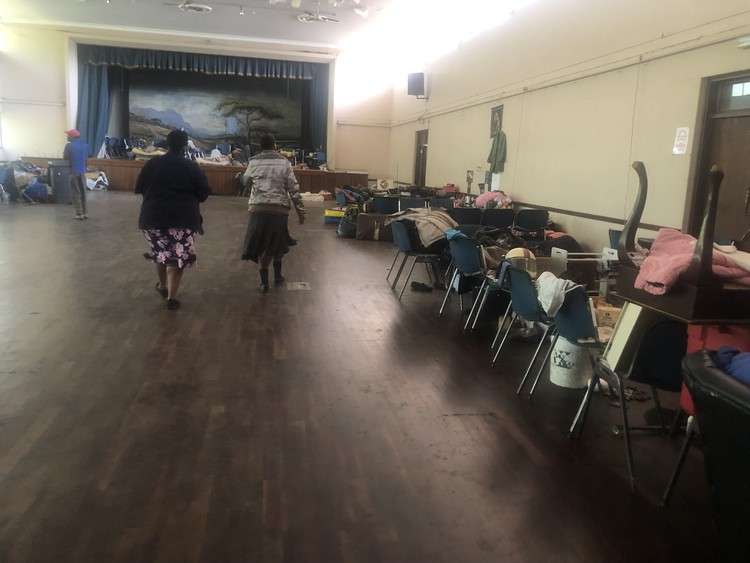Homeless people moved to Tshwane hall during Covid lockdown refuse to leave
City says Centurion hall “is becoming a health and safety hazard”
The City of Tshwane has given notice of its intention to remove 25 people living in the community hall in Lyttelton, Centurion. The group were moved there with other homeless people at the start of the Covid lockdown, and are refusing to leave. Photo: Silver Sibiya
- About 25 people who have been living in a community hall in Centurion since the start of the Covid lockdown are refusing to leave.
- In September the City of Tshwane issued the group with notice of its intention to evict them from the hall.
- They want to be accommodated closer to Centurion where they say are more job opportunities.
- But the City says it only has space in shelters in Pretoria’s inner city.
Dozens of homeless people who were moved into the community hall in Lyttelton, Centurion, at the start of the Covid lockdown more than three years ago are refusing to leave.
The City of Tshwane issued notice last month of its intention to remove 25 people still living in the hall.
They were among about 200 people who were moved from the streets of Centurion to the community hall to prevent the spread of Covid during the height of the pandemic.
Now three years later, the group is refusing to vacate the community hall. This has meant that local churches and community groups cannot use the space. The City has said that the infrastructure inside the hall has deteriorated since the occupants have been living there.
Cyril Gino from Cameroon told GroundUp he had been running things at the hall and often made communal meals for those living there. He said they wanted the hall to be transformed into a formal shelter for homeless people in the inner city. He said when the City first lodged eviction proceedings against them, they got help from Lawyers for Human Rights and managed to stop their removal from the hall.
Then on 8 September this year, the group received a new notice of the City’s intention to evict them.
Another resident of the hall, Joseph Ramayise, told GroundUp that they had refused to be moved to the City’s shelters. “They want us to go to Pretoria North, Akasia and in the CBD. Here there are job opportunities like gardening which go a long way in helping us,” he said.
Ramayise said they were surprised when they received the recent eviction notice.
Catherine Mogale, founder of NGO Kopano Manyano, said the organisation had been assisting the group with meals, among other things. “We called the City manager to address this issue. He promised to do so but hasn’t come yet. We want this group to be given alternative housing around here. We don’t want to see them back on the streets,” she said.
Louise du Plessis of Lawyers for Human Rights said the hall was “one of the first homeless camps during Covid-19” in 2020. She said some of the people were getting piece work in the area which they might not get elsewhere.
City spokesperson Selby Bokaba told GroundUp that the process of relocating the group started in 2021. “The hall was meant to be a temporary accommodation for national lockdown purposes,” he said. Bokaba confirmed that the City had approached the courts in 2021 but the matter had been struck off the roll.
He said there were shelters available to accommodate the people in the hall, but acknowledged that there were none in the area. The City was working with civic organisations to set up a shelter in the area, he said.
“Due to the deterioration of the structural condition of the hall, it is becoming a health and safety hazard for people to continue to stay there.”
Support independent journalism
Donate using Payfast

Don't miss out on the latest news
We respect your privacy, and promise we won't spam you.
Next: Transit camp for fire victims burns down in Durban
Previous: Flying the kite for mental health
© 2023 GroundUp. This article is licensed under a Creative Commons Attribution-NoDerivatives 4.0 International License.
You may republish this article, so long as you credit the authors and GroundUp, and do not change the text. Please include a link back to the original article.
We put an invisible pixel in the article so that we can count traffic to republishers. All analytics tools are solely on our servers. We do not give our logs to any third party. Logs are deleted after two weeks. We do not use any IP address identifying information except to count regional traffic. We are solely interested in counting hits, not tracking users. If you republish, please do not delete the invisible pixel.

